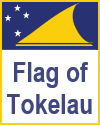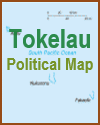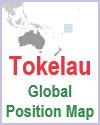Tokelau is a remote and unique territory of New Zealand, located in the South Pacific Ocean, about halfway between Hawaii and New Zealand. Comprising three small coral atolls--Atafu, Nukunonu, and Fakaofo--Tokelau has a total land area of just 10 square kilometers, making it one of the smallest territories in the world.
The population of Tokelau is approximately 1,500 people, predominantly Polynesian, with a rich cultural heritage deeply connected to their environment and traditions. The Tokelauan way of life emphasizes communal living, with a strong focus on family, community, and respect for traditional customs. The official languages are Tokelauan and English, reflecting both their indigenous heritage and the influence of New Zealand.
Economically, Tokelau relies heavily on subsistence agriculture, fishing, and remittances from Tokelauans living abroad. Key agricultural products include coconuts, taro, and breadfruit. Due to its remote location, Tokelau faces challenges such as limited economic opportunities, vulnerability to climate change, and dependence on external aid.
Despite these challenges, Tokelau is a pioneer in renewable energy, becoming one of the first territories to be powered almost entirely by solar energy. This commitment to sustainability highlights Tokelau's resilience and innovative spirit, ensuring the preservation of their way of life while addressing contemporary global challenges.
|










